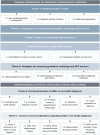Exploring Parental Experiences of Childhood Ear Health Clinics and Their Acceptability of AI-Based Diagnostic Tools: A Qualitative Study
- PMID: 40891789
- PMCID: PMC12403111
- DOI: 10.1111/hex.70421
Exploring Parental Experiences of Childhood Ear Health Clinics and Their Acceptability of AI-Based Diagnostic Tools: A Qualitative Study
Abstract
Objective: Artificial intelligence and machine learning (AI/ML) algorithms will transform the childhood otitis media (OM) diagnostic experience. However, there is limited data on parents' current experiences within clinical settings, limited research exploring AI/ML acceptability among consumers generally, and none regarding consumer perspectives on its use for childhood OM. This study aimed to explore current parental experiences of, as well as their perspectives on the use of AI/ML in, clinical care for OM in children.
Design: We conducted and thematically analysed semi-structured interviews with parents of children seen for OM within the ENT or audiology departments of an Australian urban teaching hospital.
Findings: Seven themes were identified: (1) Meeting children's needs; (2) Challenges in accessing and waiting for audiology and ENT care; (3) Urban versus rural healthcare experience; (4) Public versus private health system; (5) Strategies for enhancing paediatric audiology services; (6) Perceived benefits of AI/ML in ear disease diagnosis; and (7) Concerns and considerations regarding AI/ML in ear health diagnosis.
Conclusions: Parents have concerns about the use and development of AI/ML tools, but also acknowledge the potential benefits of such tools for healthcare delivery. Currently, the understanding amongst parents of AIAI/ML/ML tools for OM diagnosis was limited, and more education on the use and development of AIAI/ML/ML for OM is warranted.
Patient or public contribution: We did not involve patients or the public in the design of this study. However, three authors have lived experience as parents of children who have had recurrent ear infections.
Keywords: artificial intelligence; diagnosis; ear health; parent experience; qualitative research.
© 2025 The Author(s). Health Expectations published by John Wiley & Sons Ltd.
Conflict of interest statement
The authors declare no conflicts of interest.
Figures
References
-
- Stephens J. H., O'Keefe M., Schembri M., and Baghurst P. A., “Parents Need More Support: A Qualitative Study of the Experiences of Australian Parents Who Are Waiting for Surgical Intervention for Their Children With Otitis Media,” Journal of Patient Experience 7 (2019): 717–725, 10.1177/2374373519883495. - DOI - PMC - PubMed
MeSH terms
Grants and funding
LinkOut - more resources
Full Text Sources
Medical
Research Materials
Miscellaneous


